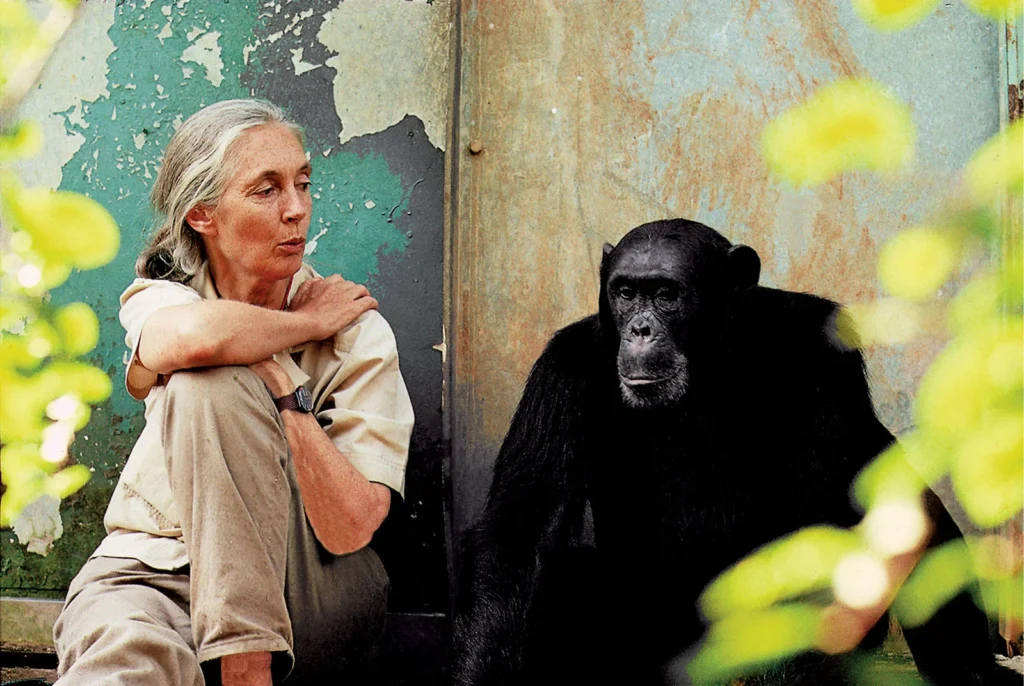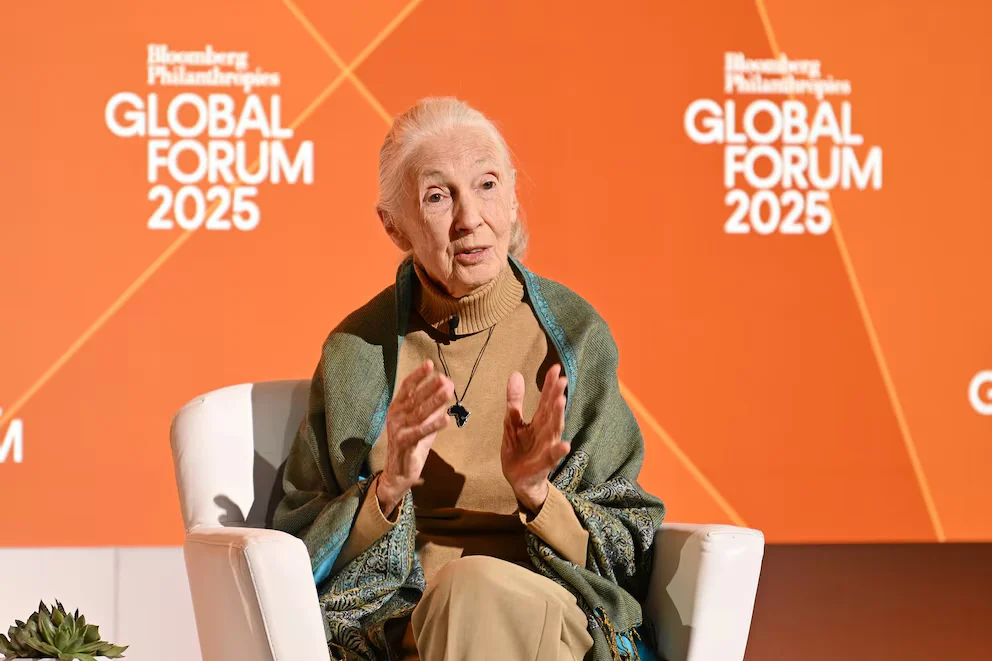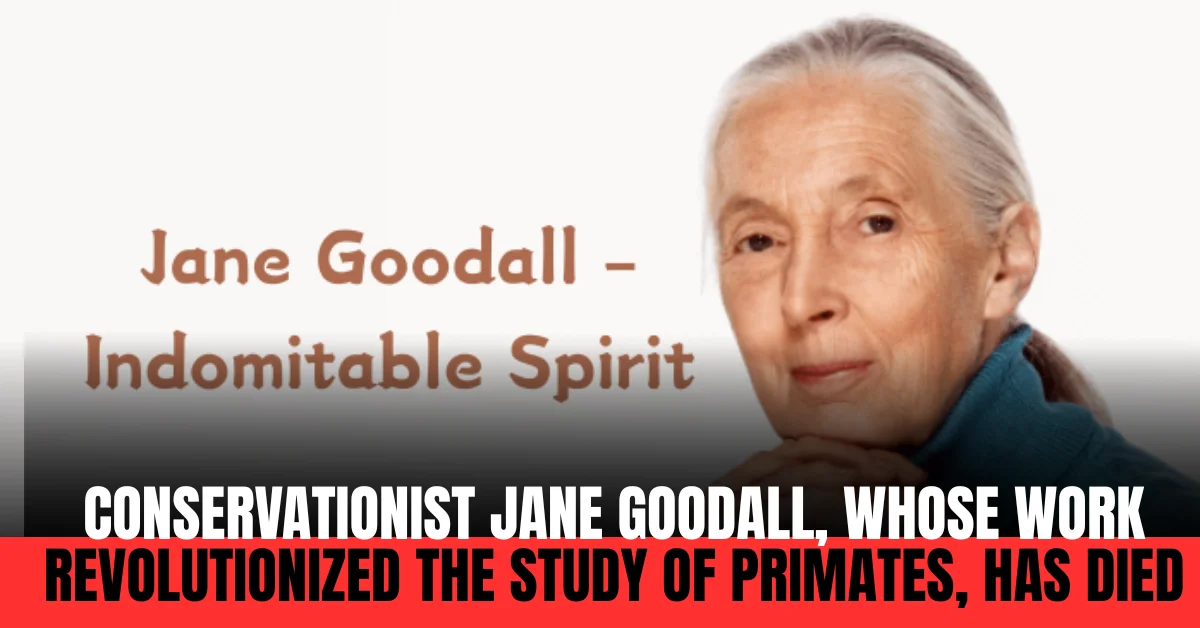Legendary primatologist Jane Goodall has died at 91. Her groundbreaking work with chimpanzees forever changed science and conservation.
Table of Contents
Conservationist Jane Goodall, Whose Work Revolutionized the Study of Primates, Has Died
Introduction
The world has lost one of its greatest scientific minds and conservation leaders. Jane Goodall, the legendary primatologist whose work with chimpanzees reshaped our understanding of animals and humanity, has died at the age of 91, her institute confirmed on Wednesday.
Known for her groundbreaking research in Tanzania’s Gombe Stream National Park, Goodall’s discoveries proved that chimpanzees share emotions, personalities, and even the ability to make and use tools—forever blurring the line between humans and animals. Beyond science, she became a global voice for environmental protection, conservation, and peace, leaving behind a legacy that will influence generations to come.
Jane Goodall’s Early Life and Passion for Animals

Born in London in 1934, Jane Goodall’s fascination with animals began in childhood. At just four years old, she observed a hen laying an egg, sparking a lifelong curiosity for animal behavior. Inspired by stories of Africa and Tarzan, she dreamed of studying wildlife firsthand.
Despite lacking formal university training at the time, her determination led her to Africa in 1960, where she began her historic work under the mentorship of Dr. Louis Leakey.
Groundbreaking Discoveries at Gombe
Observing Chimpanzee Behavior
At just 26, Goodall arrived at Tanzania’s Gombe Stream Chimpanzee Reserve. Though initially met with skepticism from both chimps and scientists, she persevered. Her intimate approach—naming chimps instead of numbering them—allowed her to discover that chimpanzees:
- Use tools by modifying twigs to gather termites.
- Eat meat, proving they are not strictly herbivores.
- Display complex emotions such as joy, grief, and compassion.
Her famous encounter with David Graybeard, the first chimpanzee to accept her, became a turning point in understanding animal intelligence and communication.
Changing Science Forever
Her discoveries challenged the notion of human uniqueness, and although criticized early on for her unconventional methods, Goodall earned respect as one of the most important ethologists in history. She later earned her Ph.D. in ethology from Cambridge University, despite never completing an undergraduate degree.
Advocacy, Awards, and Activism
From Scientist to Global Advocate

After witnessing deforestation and habitat loss in the 1980s, Goodall shifted her mission from research to environmental activism. She founded the Jane Goodall Institute in 1977, focusing on conservation and community-based programs, and the Roots & Shoots youth movement, which empowers young people to take action for animals and the environment.
Global Recognition
Over her lifetime, Goodall received numerous honors:
- Dame of the British Empire (2004)
- UN Messenger of Peace (2002)
- U.S. Presidential Medal of Freedom (2025)
Her tireless advocacy made her one of the most recognized and respected conservationists worldwide.
Jane Goodall’s Legacy
Jane Goodall’s impact spans science, conservation, and activism:
- Science: Redefined how we study animals, showing their emotional and cognitive similarities to humans.
- Conservation: Fought tirelessly against deforestation, habitat loss, and climate change.
- Inspiration: Encouraged generations of women scientists and environmentalists through her resilience and vision.
In its tribute, the United Nations praised Goodall for her lifelong dedication to protecting the planet and all living beings, highlighting the remarkable legacy she leaves behind for both humanity and the natural world.
FAQs
Q1: How old was Jane Goodall when she died?
Jane Goodall died at the age of 91 in California, while on a speaking tour.
Q2: What was Jane Goodall famous for?
She was renowned for her groundbreaking studies of chimpanzees in Tanzania’s Gombe Stream National Park, which transformed primatology.
Q3: Did Jane Goodall receive any major awards?
Yes, she was named a Dame of the British Empire, awarded the UN Messenger of Peace title, and received the U.S. Presidential Medal of Freedom in 2025.
Q4: What is the Jane Goodall Institute?
Founded in 1977, it focuses on wildlife conservation, habitat protection, and youth environmental education programs like Roots & Shoots.
Q5: What is Jane Goodall’s lasting legacy?
Her legacy includes scientific breakthroughs, conservation advocacy, and inspiring global environmental action for generations to come.
Conclusion
Jane Goodall’s passing marks the end of an era in science and conservation. From her pioneering work in Gombe to her decades of advocacy for wildlife and climate action, she not only changed the way we view animals but also the way we see ourselves.
Her message of compassion, perseverance, and environmental stewardship will continue to resonate worldwide.
👉 How has Jane Goodall inspired you? Share your thoughts and memories in the comments to honor her extraordinary life.

